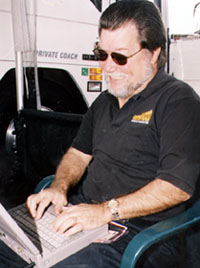| | | |||
|
| ||||
|
Apparently at the core of the upheaval is a major NHRA policy change affected by new president Tom Compton. According to several independent track operators, who requested anonymity because of ongoing negotiations with the sanctioning body, NHRA no longer is willing to deal with them as "partners" in the production of its national events. New, more restrictive contracts are said to spell out, in very large letters, exactly what the track is to do - and not to do. Gone, according to the independents, are many of the perks that made hosting an NHRA national event palatable. The NHRA no longer will share the income from entry fees with its track operators, for instance. It no longer will split the cost of track improvements with the tracks. And, perhaps most significant from a stability standpoint, the sanctioning body is moving to shorten the term of contracts. Also playing a role in the transition are two investor groups who actively are seeking racetrack properties - apparently with the full blessing of the NHRA. What would cause the NHRA to turn on track operators who, for years, were led to believe that they were member's of the organization's "extended family?" Business, my friend. Bottom line business. Obviously, it is easier to deal with one or two groups that control 14 racetracks than with 14 individual track owners, each with his own agenda. Dealing with blocs of tracks - a bloc controlled by Bruton Smith, a bloc managed by the group reportedly headed by Steve Lynn and a bloc directed by the NHRA itself - would simplify a lot of the NHRA's dealings while at the same time providing more control. Such a setup would have been extremely beneficial to NHRA, for instance, had it been in place when McDonald's came on board. McDonald's sponsored race teams owned by Larry Minor and later by Joe Gibbs, but it also was seeking, as part of its involvement, food service contracts at NHRA national event tracks. Dealing with so many independents, the NHRA never was able to deliver the number of tracks it apparently had promised in initial negotiations. That could have been a factor in the fast food chain's eventual decision to go or stay. Then there are marketing programs, insurance programs, TV contracts, so many things that are simplified if one can reduce the number of parties with whom he or she must bargain and negotiate. Certainly, the rewards for the sanctioning body could be substantial, but the game it apparently is playing is a treacherous one. Billy Meyer, the latest independent to ponder sale of his property, is one of the few independents willing to discuss the situation on the record. Meyer, whose Texas Motorplex set a new standard in dragstrip construction when it was built in 1986, reportedly will lose one of his two NHRA national events in 2001. The Texan doesn't deny that his spring race, the Castrol Nationals, failed to attract a full house. However, he cites extenuating circumstances and, more significantly, a double standard. Meyer's race date allegedly will go to Chicago, which then will become the only track other than the NHRA-controlled facility in Pomona, Calif., to host two national events. Meyer points out accurately that the Chicago track has not filled up for one race. He wonders why NHRA expects it to fill up for two. "Maybe it's time for me to just move on," Meyer said. "I can make more money with less aggravation doing almost anything else. But I love drag racing." Tom Compton has convinced racers, sponsors and the media that he indeed has a "passion" for drag racing. Meyer, on the other hand, has for 30 years acted on his passion: in recognizing the need for "stadiums" instead of strips, in building at his Texas Motorplex the first, and only, all-concrete quarter mile (for no other reason than that he knew his racer friends would love it), and in introducing new sponsors to the sport including Chief Auto Parts, 7-Eleven, Hawaiian Tropic and U.S. Tobacco. As a racer, car owner, official and racetrack owner, Meyer's passion for drag racing is not subject to question. It seems like two individuals who share such passion could find some common ground for the common good. Compton's moves may be solidly grounded in business principle. But at what price?
Dave Densmore, a paid columnist for DRO, also works for John Force. Photo by Jeff Burk
| ||||
|
Copyright 1999-2001, Drag Racing Online and Racing Net Source | ||||


